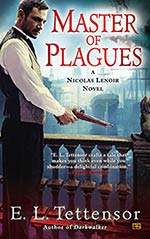
![]() Nymeria
Nymeria
8/15/2015
![]()
Many say that the most difficult endeavor for a writer is to produce an effective sequel to a highly successful book: it would indeed seem to be the case with Master of Plagues that in my opinion struggles to hold up to its predecessor Darkwalker. Don't misunderstand me, it's still a good, engaging book and I enjoyed it, but it felt less... absorbing, for want of a better word. Somehow it lacked the sense of urgency and impending doom conveyed by Darkwalker, even though the story itself is quite dramatic.
The city of Kennian is threatened by a plague (one that's chillingly similar to modern-day Ebola) that starts in poorer areas like the Camp, a cluster of tents and ramshackle dwellings for the less fortunate: due to the distance from the city and the indifference of the authorities, since the first victims are considered the dregs of society, the plague starts spreading almost unhindered - until the death toll reaches such levels as to force the powers that be to take notice.
This is one of the most fascinating sides of the book: the social dynamics drawn by the author are so rooted in reality as to present a chilling mirror of our more modern, but still selectively blind, way of thinking. The "good citizens" of Kennian at first comfort themselves with the notion that the dreary living conditions of the Camp must be responsible for the affliction, and the city's mayor - a sadly ineffective idiot in love with the sound of his voice - believes that a police cordon will be enough to keep the townspeople safe from infection, without a second thought about the effect of a lessened police presence in the city itself. When the plague starts to spread beyond the barricade, and the old wisdom of Adali healers is called into play with some success, the established physicians scoff at such notions labeling them as superstition, allowing prejudice to blind them to the only shred of hope for their patients.
This is the elusive enemy that Lenoir and his deputy Kody must fight, even before they realize the plague is not a natural occurrence but the work of a twisted mind: it's a battle waged on several fronts, against the mastermind who started it all, against the petty criminals who try to take advantage of a volatile situation and above all against the stubborn narrow-mindedness of the authorities. And this is where I failed to sense the pressure that such a situation should have entailed: even with a growing body count, general unrest and fear and the addition of a fire that sweeps through the city in a devastating wave, I somehow never had the sensation that the main characters were truly in jeopardy, that a dire outcome was looming on the horizon.
Both Kody and young Zach - the street urchin who works as Lenoir's informant - find themselves in life-threatening circumstances for example, but my definite impression, without spoiling either story-line, is that both of them come out of it far too easily: there is none of the urgency I felt when Zach was kidnapped in the previous book and Lenoir scoured the city in search of him, on the contrary he's not even aware that the boy is in any peril and that particular situation is resolved in a way I found quite unsatisfying.
Despite these purely personal misgivings, Master of Plagues expands on the characters we encountered in the first novel, adding new facets and new depth to each of them: one of the segments I most appreciated was the encounter between Kody and young Zach, where the juxtaposition of the sometimes innocent certainties of the former and the street wisdom of the latter gives way to an interesting comparison. Kody, the grown-up man, the experienced police hound, appears far more naïve than the child who disavows him of some of his certainties, especially where human nature is concerned, and Lenoir looks quite amused - in his own way - by this exchange between the two people he most cares about. There is another scene that speaks loudly of the change in relationship between the inspector and his deputy: when Lenoir scolds Kody about his lack of initiative it's a positive rebuke, one aimed at encouraging the man's professional growth and showing that Leonoir is getting out of the pernicious disinterest and disillusionment we saw hanging over him in the previous book.
The character that most shines through is that of Merden, the Adali soothsayer who helped Lenoir understand the Darkwalker and now takes an active role in the attempts to cure the plague: Merden is a wonderful blend of wisdom, humor and bedrock support both for his people and for the Inspector. What I like about him is that he takes in stride the obstacles placed in his way by prejudice, never taking an aggressive or angered stance: he possesses such a steadfast personality and there are so many untapped depths in him that I hope he will be further explored in the next books, because I believe he could develop into one of the main figures of this series. His relationship with Lenoir did already show this growth, and promises to transform into a friendship - as much as the inspector will allow himself to entertain one - that could lead to interesting narrative threads.
Even though I was unable to get involved in this story as I did with the first one, I still believe this is a very promising series, and I look forward to the next installments.
http://spaceandsorcery.wordpress.com